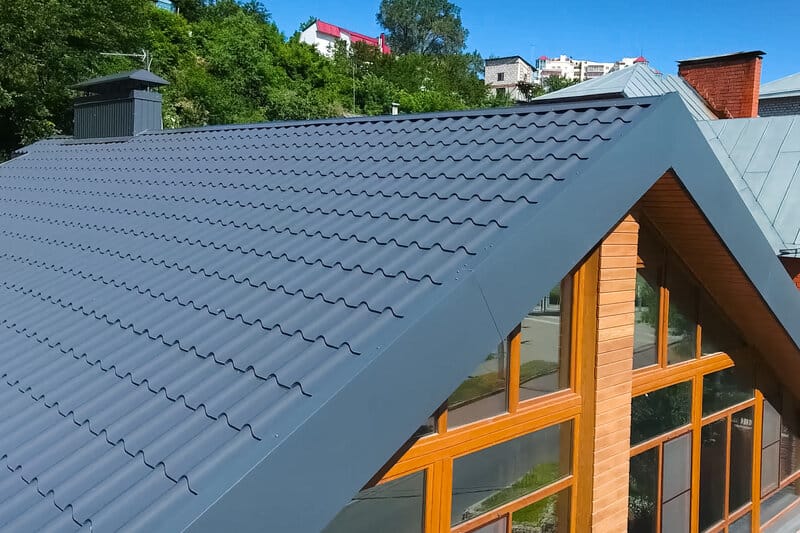
You may be familiar with vinyl siding, but did you know vinyl roofing products are also an option? More commonly referred to as PVC roofing, this material is made from two layers of PVC (polyvinyl chloride) that are reinforced by polyester. These layers are enforced using chemical treatments to further enhance the product’s strength and durability.
Is Vinyl Roofing the Best Choice For Your Bay Area Roof?
Vinyl roofing membranes are installed on top of the roofing substrate, typically on the insulation board, and underneath the final finish selection (shingles, metal, etc.). They’re designed to form a watertight barrier, protecting the roof substrate and building from water and moisture damage. However, they are best suited for flat roofs or roofs with a low slope. If you live in a home with a steep roof pitch, other materials are more suited to the job.
While known for being durable, easy to install, and long-lasting, PVC roofing is not the best choice for every roof. The more consumers understand about the product, including the pros and cons of vinyl roofing, the better choice they can make for their home or business.
As with any decision about roof repair, replacement, or roofing materials, you should always schedule a consultation or inspection with a licensed, experienced roofer.
The Pros Of Vinyl Roofing Membranes
Vinyl roofing membranes are an excellent choice for the right application. When they’re installed correctly, they last for 20 to 30 years, which is the typical lifespan of a well-maintained asphalt shingle roof. There are many reasons why PVC roof membranes are so popular.
Durability and strength
PVC is naturally a water-resistant and durable material. Its flexibility is another benefit since roofs move and flex due to temperature and humidity fluctuations or high winds. PVC roofing is chemically treated, providing additional resistance to damage from UV rays, bacteria, and fire (more on that next).
Their warrantied lifespan of between 20 and 30 years proves their durability, which aligns with the average length of time between roof replacements. Also, PVC roofs typically exceed the minimum strength requirements (200 lbs/inch) set by the American Society of Testing and Materials.
Lower installation costs
PVC roof membranes come in large rolls maneuvered into place and unrolled across the roofing substrate. They adhere to the roofing without penetrations, further increasing their waterproofing abilities. Installation methods depend on the roof’s substrate materials, but here in the Bay Area, most vinyl roofing is installed using a strong commercial-grade adhesive or via induction welding – where heat is used to adhere the PVC membrane to specifically-located metal plates.
Fire resistance
A material’s resistance to fire is increasingly important for California homeowners and their homeowner’s insurance carrier. PVC roof membranes are one of the most fire-resistant roofing materials on the market.
Energy efficiency
Their UV protective coatings are reflective, which reduces solar heat gain. They’re a popular choice in commercial buildings where heating and cooling costs can be high.
The Cons Of PVC Roofing Membranes
Some situations can diminish vinyl roofing performance. Some of the cons of vinyl roofing are:
Not made for pitched roofs
PVC roofing is designed for flat or barely sloped roofs. We often use them in commercial buildings, mid-century modern homes, or garages or patios with flat roofs or covers. They are not designed for roofs with a slope greater than 2 1/2.
Does not withstand consistently cold climates
This isn’t a dealbreaker in the Bay Area, where consistently freezing temperatures are rare. However, we don’t recommend using vinyl roofing if you have a vacation home in the mountains or in a state with more extreme winter temperatures.
Higher first-time costs
PVC roofing membranes are one of the more expensive products on the market, even if installation costs are more affordable. That said, their more durable lifespan tends to make up for that in lifetime costs.
Shrinking over time
Vinyl roofing membrane has a tendency to shrink over time. This can make it pull away or gap in places, leaving the roof more vulnerable to leaks and moisture issues. However, proper installation should protect you from this, as will annual roof inspections – particularly toward the end of your roof’s lifespan.
Schedule A Vinyl Roofing Quote From Pacific Coast Roofing
Are you ready to replace a flat roof for your home or business? Schedule a free, no-obligation quote from Pacific Coast Roofing. We’ve helped hundreds of Bay Area homeowners choose the best and longest-lasting roofing materials for their homes. We can help you determine whether a vinyl roof membrane is the right choice for you.

